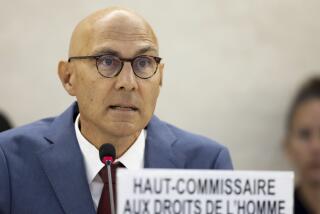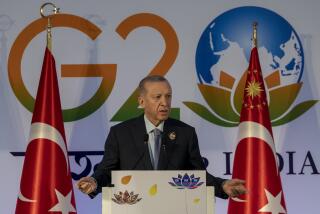Turgut Ozal: The Kurds Must Go to Their Own Places
- Share via
ANKARA, Turkey — Squat, dynamic and controversial, Turkish President Turgut Ozal has emerged as a key international player in the Gulf crisis and in the Kurdish refugee tragedy that has mushroomed in its aftermath.
After Iraq invaded Kuwait, Ozal gave teeth to the international embargo against Saddam Hussein by immediately shutting down pipelines that carried Iraqi oil to market via the Turkish port of Adana. He massed the Turkish army along the border with Iraq, causing more than 100,000 Iraqi soldiers to be pulled from the southern front, and he allowed U.S. bombing raids against Iraq from the big Incirlik Air Base outside Adana.
Ozal, who believes that Turkey’s future lies in the free-market West, conferred frequently with President George Bush during the crisis. As a postwar “thank you,” the Turkish leader and his wife, Semra, spent a weekend as the Bushes’ house guests at Camp David.
Ozal was interviewed in the Pasha suite of the new Ciragan Palace Hotel in Istanbul, where, on a rare day off, he had been inspecting the Bosporus waterfront and waving to well-wishers on the tea terrace below. The interview was conducted in English, which Ozal speaks fluently, but not always idiomatically.
Question: The safe-haven idea in northern Iraq was yours, wasn’t it?
Answer: Yes . . . . I saw it was impossible for us to take those 500,000 or 600,000 refugees. . . . For a short period of time, you can take care of them, but not in a good condition, I tell you. . . . The best solution is for those people to go to their own places. Now, first of all, temporarily to prepare some places in northern Iraq, which, geographically, is a better place than southern Turkey. Now, I understand there are towns emptied. It is easy for coalition forces to put those people back in those towns. This way, without going into camp-tent cities, you may put those people, the city people, in the cities.
Q: Turkey took a different attitude than Iran, which just let everyone in, and said “Come down to the lowlands.” Turkey kept them at the border. Why?
A: Southeast Turkey is very mountainous. . . . There is no place inside (the mountain range near the border) . . . . You cannot integrate these people into your society. They are a different culture. We have integrated people coming from Bulgaria, 300,000 in three months (in 1989). There was one difference. Those people had some culture--I mean education. I could not put them in agricultural areas; agriculture has more people than required. Therefore, I said they should go into cities, we should find them jobs in private industry and business. We have integrated those people in 3 1/2 years. . . . These people (Iraqi Kurds) have a different culture--mostly they are mountain men, and it is very difficult to integrate them.
Q: Do you think it would be a mistake for U.S. forces to leave quickly?
A: You don’t need that much force in the south. Iraq does not pose any threat any more. I think some air power and one division is enough.
Q: How do you think the Kurdish refugee emergency will affect the Kurds of Turkey?
A: Europe does not understand the Kurdish problem. In Iraq, in Turkey, they are two different problems . . . . In Turkey, Anatolia is a melting pot for different nationalities . . . . We have Albanians integrated in Turkish society, Circassians, Abazars, Georgians and also Kurds and Bulgarian Turks. They are integrating into our society. The Kurdish rebellion against the state, like what has happened in Iraq in 1988 and 1991, it has happened in the early part of the (Turkish) republic--from 1926 to 1938. But after 1945, there was no single rebellion in those provinces. When I talk about mass movement like there was in northern Iraq, I mean they took control of whole cities . . . . Once Turkey, after 1945, went into democratic system, there is no uprising. Except a guerrilla movement, a small guerrilla movement, not a mass movement.
Q: But in Kurdish towns of southeastern Turkey, there are sometimes protests in which marchers chant “Long Live Kurdistan.” How do you evaluate things like that?
A: These are small minorities . . . . The main body of the Kurdish people is not in east Anatolia anymore. It is in Istanbul, Ankara, Izmir, Antalya. It is integrating into this society . . . . (Europeans) talk about the autonomy. It is nonsense. (The Kurds) become a minority in that case. Today, they are part of the majority. Today, the government invests in that area, southeast Anatolia, 20 or 30 times the tax revenues that it collects from that area . . . . The best thing for the Kurdish people is to have the right place in the society, cultural, economical. I mean they have full rights of any citizen of Turkey. Like the United States. You have Greek Americans, Turkish Americans, Polish . . . . Turkish is also in that sense a melting place . . . .
There is one important element: Turkey is a mainly Sunni (Muslim) country. Kurdish people everywhere are mainly Sunni. They are not Shia, like Iran or the Arabs in Iraq. Therefore, they are much closer to the Turkish people. Because of this, there are intermarriages. Therefore, I say integration is much more possible . . . . Turkey is a democratic country.
Q: You at one stage are reported to have said Saddam’s back needs to be broken. How does the lengthening of Saddam’s stay in power affect Turkey?
A: Let me tell you, it doesn’t affect Turkey so much as it affects the other countries in the area. All the way through this crisis, the Iraqi government of Saddam Hussein and his ministers wanted good relations with Turkey . . . . They have talked against Egypt, Saudi Arabia, the United States, France and other countries; now they talk against Iran, but they never talk against Turkey. They would like to have a good relation with Turkey, we know that.
Q: No problem for Turkey?
A: No . . . . But for the good of the Iraqi people and also different nationalities in Iraq, I would like to see a democratic Iraq. This is good for the people of Iraq and also good for us . . . . How could Saddam Hussein be in power if there was a democratic government in Iraq? . . .
Q: Have the Iraqis asked you to reopen the pipeline through Turkey that carries their oil to market?
A: . . . . To open this pipeline and operate it, that will require a U.N. decision.
Q: What is the long-term effect of the Gulf War on Turkey’s geopolitical situation?
A: This is a troubled area. Kuwait is liberated, that’s all right, but the problem in Iraq continues. Now the Kurdish or refugee problem . . . (involving) Turkey, Iran and Iraq. The Arab-Israeli problem is continuing . . . . We have also a troubled area in Caucasus, in the Balkans. All around Turkey there are some troubled seas, problem areas. The only stable country in this part of the world is Turkey, I can say, a large country, with a sizable army, basically a Western economic system, free market, secular and democratic way of life. It is natural that its importance will go up.
Q: How do you see relations with Armenia growing? Have you had any special messages from Armenian leader Ter-Petrossian?
A: Our ambassador in Moscow visited Armenia recently. Let me tell you, I think this was an important step for the relation with Armenia. I think there are two reasons for it. One, if Armenia one day or another is going to be separated from the Soviet Union, then the outlet would be Turkey. There is no other way. It is surrounded by Georgia and Azerbaijan. The only democratic side is Turkey. Therefore . . . we have to have a better relationship.
More to Read
Sign up for Essential California
The most important California stories and recommendations in your inbox every morning.
You may occasionally receive promotional content from the Los Angeles Times.










